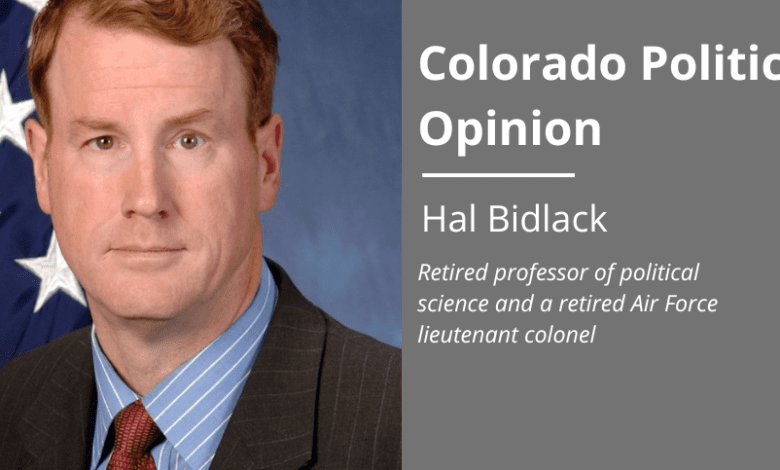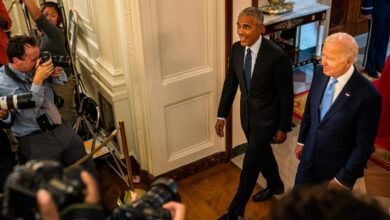Is a warning needed for Biden, Democrats? | BIDLACK | Opinion


Hal Bidlack
I will admit, for the most part, that I truly believe that President Joe Biden will likely be re-elected this November. I agree that, so far, Biden’s team has not been the best at delivering messages, leaving too much room for Republican Party nonsense to fill the void.
But then I remember it’s only May. I remember a lesson I learned when I participated in a candidate training program before my 2008 congressional campaign actually began. My instructor observed that “normal” people don’t care about politics this far away from an election. Only weird people like, well, us in that room, care about politics this far.
Stay up to date: Sign up to receive daily opinions in your inbox Monday to Friday
That’s why most political campaign experts will tell you to avoid big messaging efforts until the end of the summer or so. You can campaign early if you want, and send emails and things like that, but voters won’t start thinking about campaigns until much later, when political junkies do. You should spend these first few months fundraising like crazy (I spent up to eight hours a day on the phone, which is truly soul-sucking work), signing up volunteers, and refining your plan for the fall.
Normal people just don’t care about these things anytime soon.
That said, I’m still a little nervous about some recent research and an interesting New York Times op-ed. The pessimistic title of that article is “Believe me, Democrats. Biden could lose.” Uh-oh. And also in the same newspaper there is a story that claims that former President Donald Trump currently leads Biden in the top five states.
I have often compared current political theatrics to what we saw around 1850 or so. The nation was deeply divided and there was a national mentality among the political class that if you disagreed with someone, not only were you wrong, you were not a true American. While I don’t think we’re on the brink of a real civil war again, the dystopia Trump wants everyone to think they’re living in is casting a surprisingly effective shadow over the American electorate.
Or maybe not.
Let’s talk a little about polls, okay? Do you all remember President Michael Dukakis?
No?
Well, in 1988, then-Governor Michael Dukakis ran against the relative incumbent, then-Vice President George HW Bush, and so far into the election, Dukakis was in the lead. Bush Sr. had to deal with an economic slowdown and other challenges that made his election doubtful at best. Heck, after the Democratic National Convention, Dukakis came out of the gates with a whopping 17-point lead, but he still lost.
Now I understand that it is a tradition for those behind in the polls to denounce those polls as wrong in some way. Well, that argument might be at least a little more accurate these days. When I was in graduate school at the University of Michigan, I was fortunate to study at the best school in the country for research and research. So I ended up taking six courses on statistics and fairly advanced research, which gives me at least a little confidence to say that research is increasingly getting it wrong.
Why? Well, when I studied polling in the 1990s, you did polls in two ways: you had some subset of your sample where you sent real human pollsters to people’s homes (people don’t lie to poll participants in their homes so as easily as they do over the phone) and the rest were carefully selected people contacted by phone. A little sophisticated math allows you to weigh the results to more adequately reflect general opinion.
I don’t need to tell any of you about the problem with landlines and surveys these days. Few young people have a landline telephone (they can’t even dial a rotary telephone, but that’s a different matter) and there are no telephone directories for cell phones.
The key to adequate polling is arriving at a sample that accurately reflects the opinions of the population you are trying to understand. Cell phones make this much more difficult. Although research organizations are working hard to find ways to deal with the cell phone problem, it is very difficult to obtain a representative sample. If you still want to call landlines, your sample will be skewed, as older people like me are much more likely to have a landline than a child. So the polls themselves seem, at least to my eyes, more likely to be wrong.
And while any final analysis of what the hell the Trump Effect is will have to wait a generation or two to be fully researched, in my heart I have a hard time believing Trump’s lies, his serial adultery, his business shenanigans, and his multiple trials and probable convictions. completely pulling the wool over the eyes of the American voter for the second time. Maybe, but I can’t imagine it working, to the extent that the opposition (to include lots and lots of independent groups who will gain advertising time) will hopefully keep a steady stream of Trumpian lies front and center among the American electorate.
Oh, and access to abortion could also save the day for Biden.
Ultimately, the article is correct, insofar as Democrats it could hand the election to Trump if they make the mistakes of 2016 and don’t take him seriously. His base continues to believe everything he says and settle for alternative facts, but his base is perhaps 25% to 30% of all voters, so he will clearly have to choose many independents and others who They are, at least currently, not as open to his various demagogic messages, and this may be what saves the nation in the end.
Stay tuned.
Hal Bidlack is a retired political science professor and retired Air Force lieutenant colonel who taught for more than 17 years at the U.S. Air Force Academy in Colorado Springs.




